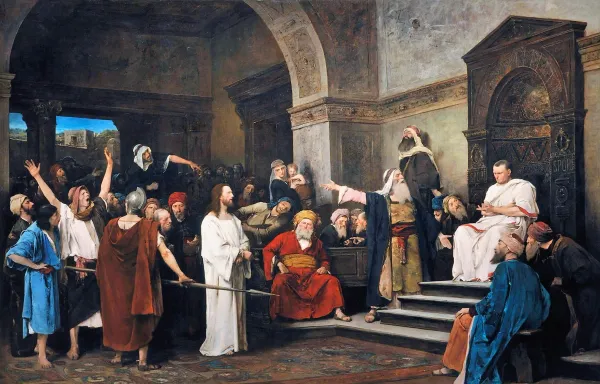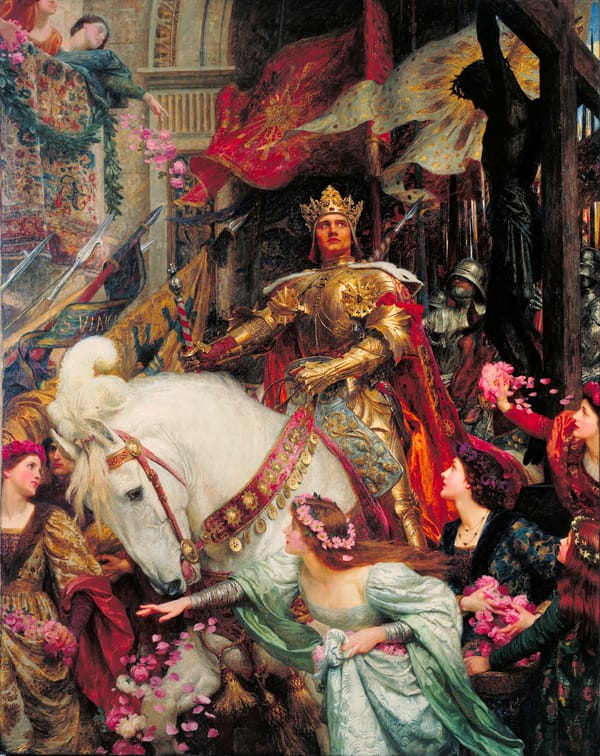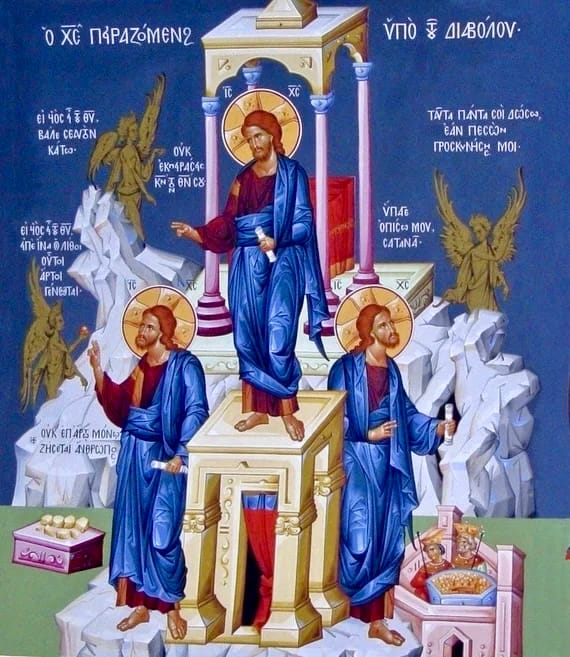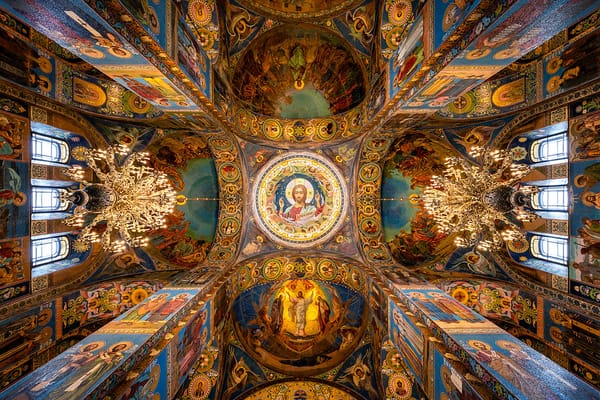Whence Virtue in Light of Apocalypse?
Whatever is virtuous in light of our divine life in Christ must ever expect, with no exception or suspense, what is imminent.
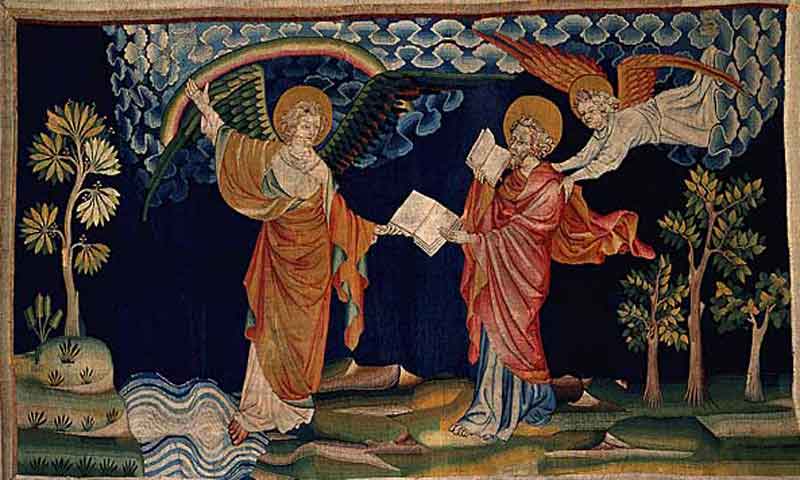
I tell you, brothers and sisters, the time is running out.
From now on, let those having wives act as not having them,
those weeping as not weeping,
those rejoicing as not rejoicing,
those buying as not owning,
those using the world as not using it fully.
For the world in its present form is passing away.
- St. Paul, I Corinthians
What does apocalypse mean for our practice of virtue?
Whence our call to prudence, say, or to justice in the context of imminent parousia? Or when we insist that life's meaning is found in something beyond what is worldly?
Because it's really no question, after all, that an eschatological reckoning of the future (and, for that matter, of even the past) does a number to classical conceptions of virtue.
These questions burn in me with more vigor lately. I just finished David Bentley Hart's Tradition and Apocalypse, wherein he cogently and carefully illustrates the early church's apocalyptic outlook on the world, and on everything. "It should never be forgotten," he writes, "that Christianity entered human history not as a new creed or sapiential path or system of religious observances, but as apocalypse."
Others, too, have noted (often only after sifting through junkyards of long-lost lore, and having disposed of anachronistic imaginations about our Christian forbears) the early church's fierce eschatological hope and the fundamental role such expectations played in shaping both their experience and practice of Christian faith, as well as the doctrine that coalesced around it. A friend (Brian) shares this, by German philosopher Gustav Landauer:
The humans of the Christian world were overwhelmed; they were overwhelmed by soul and awe and metaphysical anticipations that concerned the meaning of the world; a meaning that goes beyond earthly life and experience. We can, for example, read Augustine and see how the wisest philosophers turned into children, how the most marvelous speakers began to mutter, how Roman public servants and aristocrats became monks and ascetics. These people were infused. Christianity is a special form of faith, a special form of infusion. It asserts that the world has no reality, but that our life has a goal and meaning; a meaning that goes beyond all earthly life, beyond everything that is worldly, beyond everything that is material.
And of course, this fervor should only be expected. Christ himself spoke in eschatological extremes. From Luke 21:
But take heed to yourselves lest your hearts be weighed down with dissipation and drunkenness and cares of this life, and that day come upon you suddenly like a snare; for it will come upon all who dwell upon the face of the whole earth. But watch at all times, praying that you may have strength to escape all these things that will take place, and to stand before the Son of man.
Surely such an environment, pining always for something "beyond everything that is material," per Landauer, leaves scant room for any conception of virtue not bathed in these obsessively anticipative and "other-worldly" postures. Indeed, I can imagine almost nothing more consequential to our practice and even our definitions of virtue – the idea of virtue itself, of course, long predating even the earliest Christian communities – than an expectation that, quite soon, all things will meet their ultimate fulfillment (or demise).
Origen, among others, took this seriously in his age – one that, like ours, exhibited some dissonance, and even a growing suspicion, about imminent parousia. He suggested that we, ourselves, might forestall this final fulfillment of all things by our failures to live fully in light of them, and so suggested with refreshed urgency the celibate life (that is, a symbolic renunciation of posterity) as an act of faith – a way to beckon the the Kingdom of God ever nearer. From Contra Celsum, Book VIII, 22:
He also who is unceasingly preparing himself for the true life, and abstaining from the pleasures of this life which lead astray so many — who is not indulging the lust of the flesh, but keeping under his body, and bringing it into subjection — such a one is always keeping Preparation-day.
The Kingdom of God is at hand. Impending denouement is a way of life.
But does this not turn virtue on its head? Consider prudentia (seeing ahead, considering consequences) – what is ahead when apocalypse is both anticipated and hastened, and those crafting grand plans are chided? What is temperatia, or moderation, with no guarantee (or even hope) of tomorrow? "The poor you will always have with you," Jesus says, in rebuke to those who note the exorbitant cost of his anointing. "But you will not always have me."
Indeed, if apocalypse does not transform how we think about the future, then the claim is vacuous. If it does not undermine our "plans for tomorrow," then it is unserious. "You do not know about tomorrow," writes St. James. "What is your life? For you are a mist that appears for a little time and then vanishes."
At the very least, I contend, sincere eschatological hope unties the binds that lend our conception of virtue any common-sensical justifications. Virtue remains, maybe, but perhaps in a meaningfully different mode.
The truth is, simply, that parousia just is not fitting. It does not accord with life as we are most readily equipped to know it. The idea suspends over our material existence like a sort-of wildcard – apocalypse is a fundamental, but only ever attempted, transformation of our view forward and backward. It is even, maybe, an unjustifiable prior from the purview of a virtue-first outlook on life (prudence, say, would seem to requires us to assume that tomorrow will most definitely come to pass). But this is precisely why apocalypse was, and remains, so powerful an idea – per Hart, it is an apocalyptic perspective that has united all the more durable Christian traditions across their different (and often imagined) dogmatic differentials.
Justifying apocalypse is another topic for another day. But I think there's the rub, for virtue.
That is: whatever is virtuous in a world of imminent rapture, and in light of incarnation, it is not common-sensical. It is not any obviously-discernible abstraction of ideals that arises readily out of what tends, in our socio-economic life (unperturbed as that dimension at least seems to be by any imminent eschatological anticipations), toward sustainable and efficacious and "productive" living.
Whatever ideas of virtue that linger after apocalyptic expectations truly take root cannot but be oriented toward the future, and perhaps even more so than if our advance planning remained undisturbed by any eschatological horizon.
Christianity cannot speak of the virtues as goods of a well-ordered human life without completely recasting them as preparatory for and participation in the eschatological horizon.
-Bishop Daniel E. Flores, commenting last month on Christ's admonition in Luke 21
In other words, insofar as our understanding and practice of virtue is encased by the finitude of our material existence, our virtues are not Christian. They do not share in any eschatological hope or horizon. They are, in their last word, nihilistic.
Rather, whatever is virtuous in light of our divine life in Christ must ever expect, with no exception or suspense, what is imminent. Thus comes a renewed motivation for a different sort of virtue perhaps more vigorous and urgent than before – one that entails a fervent self-denial rooted in soil that no non-eschatological purview could germinate.
Here is Jesus in Bethany (Matthew 26), recasting virtue in light of apocalypse.
“Why this waste? For this ointment might have been sold for a large sum, and given to the poor.” But Jesus, aware of this, said to them, “Why do you trouble the woman? For she has done a beautiful thing to me. For you always have the poor with you, but you will not always have me.
And in Galilee (Luke 18), recasting again.
And a ruler asked him, “Good Teacher, what shall I do to inherit eternal life?” And Jesus said to him, “Why do you call me good? No one is good but God alone. You know the commandments: ‘Do not commit adultery, Do not kill, Do not steal, Do not bear false witness, Honor your father and mother.’” And he said, “All these I have observed from my youth.” And when Jesus heard it, he said to him, “One thing you still lack. Sell all that you have and distribute to the poor, and you will have treasure in heaven; and come, follow me.” But when he heard this he became sad, for he was very rich.
And again in Jerusalem (Luke 21), observing in the Temple.
He looked up and saw the rich putting their gifts into the treasury; and he saw a poor widow put in two copper coins. And he said, "Truly I tell you, this poor widow has put in more than all of them; for they all contributed out of their abundance, but she out of her poverty put in all the living that she had."
And again, in beckoning his disciples, and demonstrated in-action by those who heeded his call (Mark 1).
Then they abandoned their nets and followed him. ... So they left their father Zebedee in the boat along with the hired men and followed him.
Prudence, temperance, justice, fortitude, thrift, industry – these remain. But add urgency (you will not always have me), abandon (sell all you have), spontaneity (put in all the living that she had), haste (they left their father in the boat), and all the connotations that inhere within an eschatological vista.
Because insofar as Christianity is apocalypse, Christian virtue is apocalyptic.


